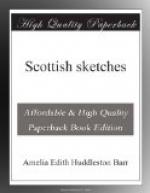So things went on until the close of the year. By that time the affairs of the broken firm had been thoroughly investigated, and it was found that its liabilities were nearly L20,000 above its assets. Suddenly, however, bundle wools took an enormous rise, and as the stock of “Callendar & Leslie” was mainly of this kind, they were pushed on the market, and sold at a rate which reduced the firm’s debts to about L17,000. This piece of good fortune only irritated David; he was sure now that if Robert had continued the fight they would have been in a position to clear themselves. Still, whatever credit was due the transaction was frankly given to David. It was his commercial instinct that had divined the opportunity and seized it, and a short item in the “Glasgow Herald” spoke in a cautiously flattering way of the affair.
Both John and David were greatly pleased at the circumstance. David also had been perfectly sober during the few days he had this stroke of business in hand, and the public acknowledgment of his service to the firm’s creditors was particularly flattering to him. He came down to breakfast that morning as he had not come for months. It was a glimpse of the old Davie back again, and John was as happy as a child in the vision. Into his heart came at once Dr. Morrison’s assertion that David must have some regular duty to keep his life erect. It was evident that the obligation of a trust had a controlling influence over him.
“David,” he said cheerfully, “you must hae nearly done wi’ that first venture o’ yours. The next will hae to redeem it; that is all about it. Everything is possible to a man under forty years auld.”
“We have our final meeting this afternoon, uncle. I shall lock the doors for ever to-night.”
“And your debts are na as much as you expected.”
“They will not be over L17,000, and they may be considerably less. I hope to make another sale this morning. There are yet three thousand bundles in the stock.”
“David, I shall put L20,000 in your ain name and for your ain use, whatever that use may be, in the Western Bank this morning. I think you’ll do the best thing you can do to set your name clear again. If you are my boy you will.”
“Uncle John, you cannot really mean that I may pay every shilling I owe, and go back on the Exchange with a white name? O uncle, if you should mean this, what a man you would make of me!”
“It is just what I mean to do, Davie. Is na all that I have yours and your children’s? But oh, I thank God that you hae still a heart that counts honor more than gold. David, after this I wont let go one o’ the hopes I have ever had for you.”
“You need not, uncle. Please God, and with his help, I will make every one of them good.”
And he meant to do it. He never had felt more certain of himself or more hopeful for the future than when he went out that morning. He touched nothing all day, and as the short, dark afternoon closed in, he went cheerfully towards the mill, with his new check-book in his pocket and the assurance in his heart that in a few hours he could stand up among his fellow-citizens free from the stain of debt.




